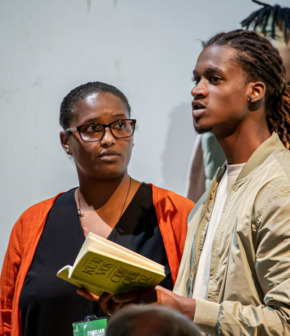Guiding Principles

This website presents Traction’s experience in co-creating inclusive new operas, using innovative digital technology.
That work is already available on the Traction website and European Commission's CORDIS Traction website, along with detailed research reports. The open-source technologies have also been placed in the public domain on the Traction project Wiki site.
Simply because Traction is about encouraging change, in opera, in the creative industries and in society more widely. Our aim was to test some new ideas about co-creation, opera and technology, not just for their own sake but in the hope that they would help people in these fields.
The answer is simpler than it might seem. Co-creation is a forgiving practice. It welcomes beginners, especially professional artists, including producers and mediators, who want to involve non-professionals in creating art. In the absence of training opportunities or qualifications, there are few alternatives to starting work and learning as you go.
This is not an invitation to naively rush in where wiser souls might fear to tread. As with any journey, preparation is essential:
Explore the web, films, podcasts, blogs and much more. The resources offer some starting points.
Listen to their stories and their advice. Don’t limit yourself to professional artists, though: talk to people who have participated in co-creation as non-professionals. Mostly, people are generous in sharing their ideas and experiences to those who are really interested.
Talk to community organisations in your neighbourhood, learn about their work, and look for common ground. Tell them about your own work and your ideas about involving new actors. The Liceu spent 18 months in community dialogue with local groups before beginning the co-creation process.
As you read and talk to people about co-creation, you can start thinking about a project. Don’t be too ambitious though: start small and test the water. Success is a route to empowerment. A small project that exceeds everyone’s expectations is better than a bigger one with mixed results: good experiences build skills and confidence. They encourage people to be more ambitious next time. And if the work doesn’t succeed in every aspect, don’t be disheartened. Talk honestly about what has happened and ask how it could be done better next time.
In co-creation, what matters first is the quality of the journey: it should be enjoyable, meaningful and rewarding in itself, irrespective of the destination.
If the artistic result is good—and it’s much more likely to be good if getting there has been good first—it will validate the journey. This is not to place the process over the product. Both are essential, because they reinforce one another, and each should be of the highest possible quality. But the process comes first, literally and metaphorically. If that doesn’t work, the result will not be co-creation, however good it might be in other terms.